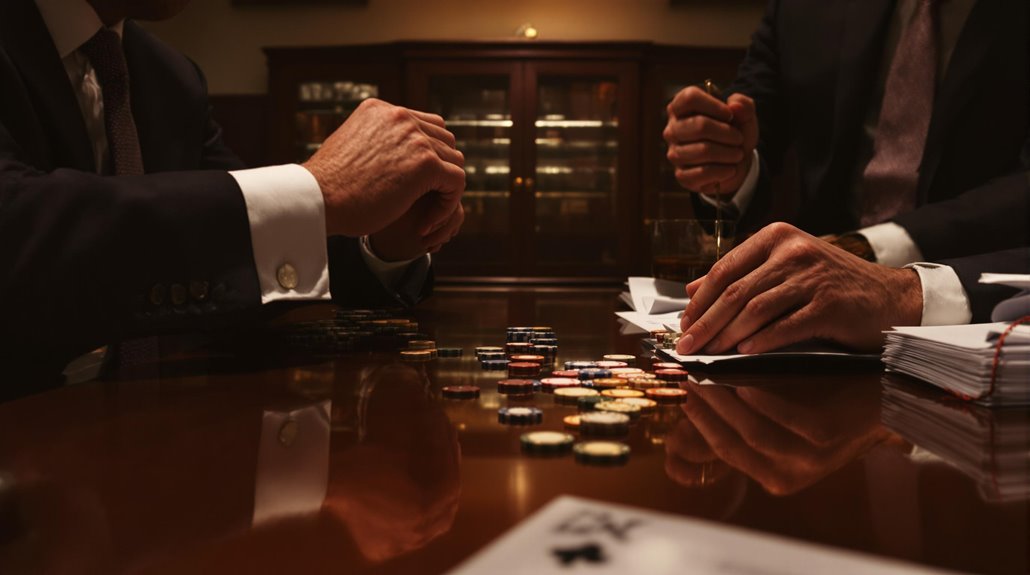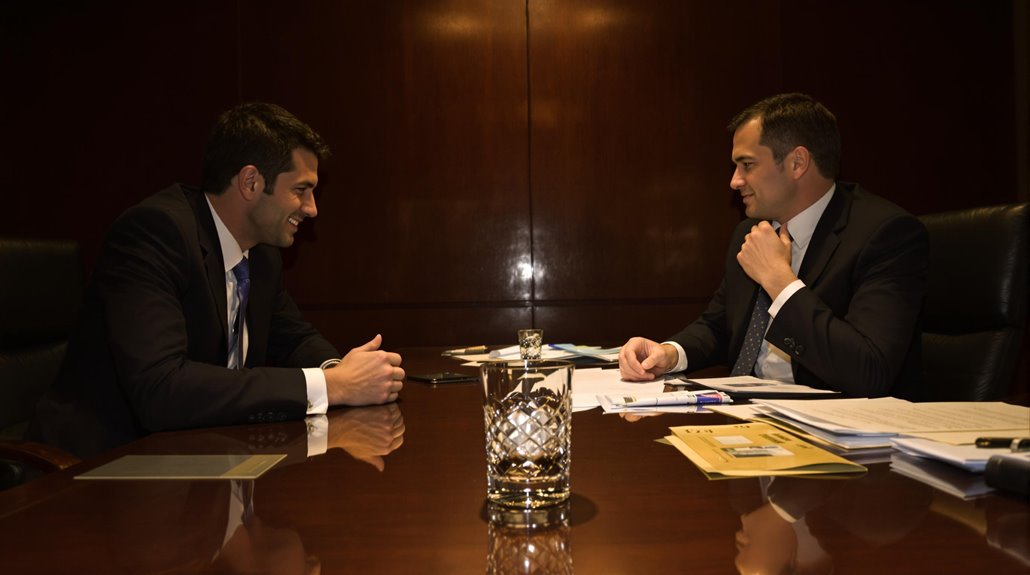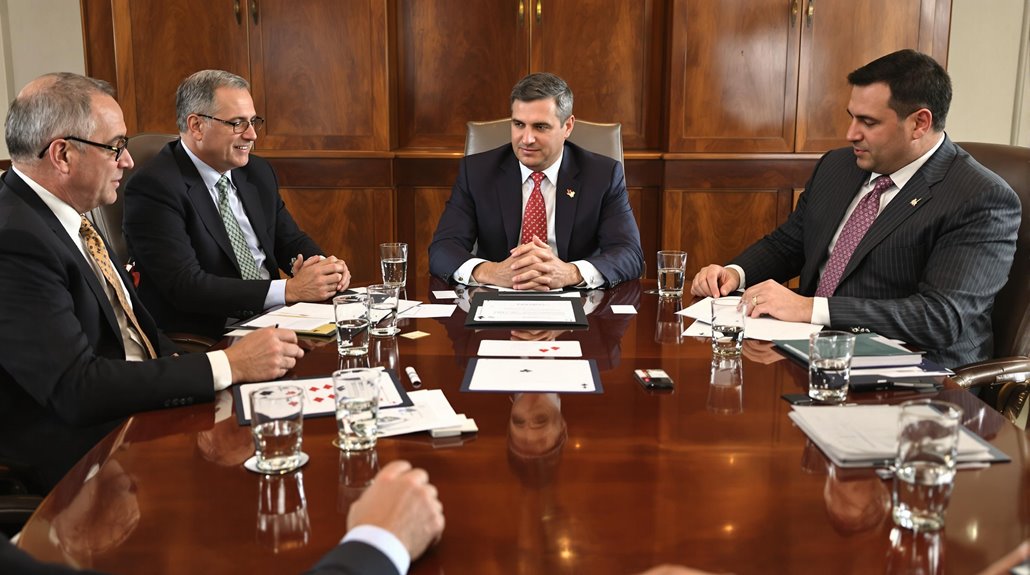Picture playing cards with friends and making deals with business partners – they're a lot alike! When you play cards, you watch how people act. Are they smiling? Do their hands shake? It's the same when you make big deals. You need to pay close to how the other person acts. Watch their face. Listen to their voice. Just like in cards, you must stay calm and know when to make your move. The more you see how cards and deals are the same, the better you get at both. When you understand people, you win – at cards and in business.
Key Takeaways
When you're making big deals, watch how people act – just like poker players do. Look at their faces and how they move to learn what they're really thinking.
Stay calm when things get tense. Don't let your feelings make you choose badly. Good poker players and deal makers know this well.
Pay close to what people say and do. If they act one way but talk another way, they might not be honest with you.
Pick the right time to make your move. Smart poker players wait for the best moment, and so should you in business talks.
Know how much power you have, like poker players know their chips. This helps you see how strong you are when making deals.
Reading Between the Lines

People who are good at making deals know how to read hints from others. When you talk with someone about a deal, look at their face and how they move. These little signs can tell you what they really think.
Watch how they sit and look at you. Listen to how their voice sounds. When people try to hide what they think, their body often gives them away. You might see them get nervous or stop talking.
Be clear when you talk too. This helps both of you know what's going on.
Take your time. Look and listen well. Being patient helps you make better deals.
The Psychology of High Stakes
When things feel scary or important, watch how people change. Look for small signs that show they feel worried.
You can stay calm by taking deep breaths and stopping to think. This helps you make good choices even when others get upset.
Learn ways to keep your cool – like counting to ten or taking a quiet moment.
When you stay calm, you can think clearly and see what's really going on.
Reading Pressure Points Effectively
Looking for pressure signals is like being a good friend – you learn to tell how others feel. Both poker players and people who sell things know how to do this well.
When you talk with others, watch how they act. Look at how they sit and if they look at you. People who feel sure of themselves sit up tall and look right at you. People who feel unsure might move around a lot or look away.
Think about how fast they make choices too. Fast choices can mean they're very sure – or not sure at all. Slow choices mean they're thinking hard.
To use what you see, try to match the good signs you spot. Keep calm and stay relaxed. This helps others trust you when big choices need to be made.
Mental Game Under Stress
When the game gets tough, your mind needs to stay strong. The best players keep their cool when things get stressful. You need to watch how others act while staying calm yourself.
Learn to deal with hard moments by being ready to change your plans. Build up your trust in yourself step by step. Stay alert to any risks.
When big choices come up, keep your mind clear. Find ways to stay calm so you can think well under stress.
Struggling to hit your sales goals?
Stop losing leads and wasting time on manual tasks. Automate your sales process to close deals faster and grow your business effortlessly.
Discover how to transform your sales today!
Emotional Control Strategies
When things get tough, staying calm is key. Just like learning to ride a bike, you can learn to handle big feelings. Think of it as having special tools in your pocket to help you feel better.
When you know how to stay cool, you can work better with others. It's like having a superpower that helps you make good choices.
Here's what you can do when you feel:
| When you feel | Try this | What happens |
|---|---|---|
| Worried | Take big breaths | You think better |
| Mad | Take a break | You make smart choices |
| Not sure | Picture doing well | You feel stronger |
| Want to rush | Count to ten | You pick the right time |
| Too much at once | Talk kindly | You make friends |
The more you practice staying calm, the better you get at it. It's like a muscle that grows stronger each time you use it. When you can control your feelings, you can see what others feel too. This helps you work better with people, just like playing nicely with friends at recess.
Try these tips every day. Soon, you'll be ready for any big moment that comes your way.
Recognizing Deceptive Tactics

When you meet someone who wants to make a deal, look closely to see if they're being honest. Just like watching someone play cards, you need to spot signs that show what they really want.
Listen when different people on their team talk – do their stories match? Be careful when they make big promises that seem too good. Watch out if they avoid giving clear answers.
Some people try tricks to get what they want. They might've one nice person and one mean person talk to you. Or they may rush you by saying you must decide right away. They could even hide small mistakes in the papers they give you.
Don't let anyone push you into a quick choice. Take your time to check if what they say is true. Ask other people about their claims. Stay on your own schedule.
Smart deal-makers might try to slowly change the deal bit by bit, so pay close attention to every detail.
Mastering Strategic Information Control
Information control helps you make smart choices. You need to gather facts and share them with care. This helps your team work better together.
| What to Watch | Why it Matters | What to Do |
|---|---|---|
| How Well We Do | See results fast | Check scores and make changes |
| Info Sharing | Learn from others | Share facts the right way |
| Using Tools | Make better choices | Use tools wisely |
Use simple charts to see how you compare to others. Good info control helps you use what you have in the best way. Smart leaders know it's not just about getting facts – it's about using them to do better work.
Building Your Winning Hand

Before you talk with others, think about what you have and what you need.
Watch how people act and move – this can tell you what they really want.
Make friends who can help you and share news at the right time.
This will make you stronger when you work out deals with others.
Know Your Position First
Let's talk about three things that make great players different from new ones: knowing where you sit, playing smart, and acting the same way each time.
When you check your spot at the table, keep it simple. Look at the basics. When you have good cards, stay quiet early on. This helps you think better and win more chips.
Top players don't hide when they bet big – they just try to win as much as they can. Fast calls often mean weak hands. Players who talk a lot when they make big bets usually have strong hands.
Learning how others act helps you play better. You don't need to look for tiny clues in how people move. Focus on where you sit and act the same way each time you play.
Read Opponents' Hidden Signs
Look at your friends at the poker table. They show little signs without knowing it. Watch how they play with their chips or sit in their chair. Look at where their eyes go.
Listen to how they talk during the game. If they chat a lot early in the game, they may have bad cards. If they talk a lot near the end, they might've good cards.
Some players act big or try to push you around – don't let them trick you. Smart players may try to fool you with fake signs.
Look for things they do over and over, not just once. Think about how much money is in the game when you try to read these signs.
Stack Strength Through Strategy
Playing poker is easier when you know about stack sizes. Stack size means how many chips you and your opponents have. When you have lots of chips, you can play more hands. When you have few chips, you need to be careful.
Where you sit at the table matters too. A good seat helps you win more with big stacks. But when stacks are small, having good cards is more important than where you sit.
| Stack Size | Good Seat | Bad Seat | What to Focus On |
|---|---|---|---|
| Small | Play more hands | Play less hands | Good cards |
| Medium | Bet for value | Stay safe | Pot size |
| Big | Play many rounds | Try to draw | Future bets |
| Tournaments | Change style | Play careful | Stay alive |
When betting, think about your stack size. With a big stack, you can play hands that make money over many bets. With a small stack, keep it simple and look for strong hands right away.
Timing Is Everything
Time matters when we talk about making deals. Just like in a game, knowing when to act can help you win or lose. If you wait too long or move too fast, you mightn't get what you want.
Think of time like a tool you can use. Sometimes you need to wait and be patient. Other times you need to act fast. Look at how the other person acts. Are they in a rush? Do they've all day? When you see these things, you can pick the right time to make your move.
The key is to use time to help you, not hurt you. When you plan well, you can make good choices about when to talk and when to wait.
Body Language in Negotiations

When we talk with others in meetings, our body tells a story. Standing tall and keeping our back straight helps us feel strong and lets others know we mean business.
Watch how the other person sits and moves – this can tell you how they really feel. When they smile or frown, their face shows what's in their mind.
To help them trust you, try to copy their good moves, like nodding when they nod. Just make sure you stay strong and sure of yourself too.
Power Poses Matter Most
Stand tall and keep your shoulders back when talking with others. This helps you feel strong and sure of yourself. Look people in the eye and move in a way that shows you're calm.
When we feel big and open, our body helps us feel less worried. It's like how a superhero stands – feet apart and head high. This really works! Try it next time you need to talk about something big.
Move your hands to show what you mean when you talk. Keep your body open and relaxed. This helps others trust you more.
When you act strong on the outside, you begin to feel strong inside too.
Reading Physical Comfort Levels
When someone feels good talking with you, they show it in how they stand and move.
Watch if they cross their arms or move away – this means they mightn't feel at ease. People who play with things like pens or move a lot may feel worried.
Look at how they use their eyes when talking. Meeting eyes helps build trust.
But if someone stares too hard, they may try to act tough. If they look away a lot, they might feel unsure.
Stay about two steps away when you talk – this helps people feel safe. If you stand too close, they might feel scared.
Keep your own body open and friendly. Stand tall but relaxed.
How you move and stand can help others feel better too.
Mirroring Builds Trust Fast
When we talk with others, we can build trust quickly by being like a friendly mirror. Just like when you smile at someone and they smile back, you can match how the other person acts and talks.
Watch how they move their hands and speak. If they talk fast or slow, try to match their speed. If they use certain words often, you can use those words too. But don't copy them exactly – that would feel fake.
When you mirror someone in a natural way, they start to feel safe with you. They see that you get them. This helps both of you work better together and find good solutions that make everyone happy.
Power Plays and Counter Moves
Let's talk about power in deal-making. When we want to make a deal, knowing how to use our power – and how to handle others' power moves – helps us get good results.
Making the first offer is like taking the first step in a dance. It helps set the song we'll all dance to. But we must be nice while staying strong.
Sometimes people try to push us around in deals. They might say "do this or else" or keep asking for the same thing over and over. When this happens, stay calm. Talk about facts, not feelings.
Power comes in many forms. You might know a lot about something, or you might be friends with key people. Both can help you.
What others think about your power matters just as much as the power you really have.
Your face and body tell a story too. Stand tall, smile, and look people in the eye. This helps you look strong while making friends in business.
Leveraging Multiple Stakeholders

Working with many people in a company takes care to do well.
Think of it like being at a big family dinner – you need to talk to everyone and know what they want.
You need to make friends with people at all levels.
Don't just talk to one person. Talk to the IT person, the boss, and others who make choices.
Keep track of who you meet and what they say. Set up lots of meetings early on.
Good notes and clear talks help everyone agree faster.
When all the right people work together, deals get done better.
Stay in touch with everyone and keep the group moving forward as one team.
Understanding Deal Flow Patterns
Deals come and go in patterns we can learn to spot. Think of it like watching waves at the beach – some are big, some are small, but they follow a beat.
When you watch deals long enough, you start to see what makes a good one. It's not about seeing lots of deals. It's about finding the right ones through people you know and trust.
Here's what helps you spot good deals:
- Make friends who share good deals with you often
- Know what you want to see in a deal
- Look back at old deals to learn what worked
Think of it like picking fruit. You don't want just any fruit – you want the best ones that fit what you need. When you know the patterns, you can grab the sweetest deals when they show up.
Remember: Good deals often come from the same places over and over. Stay close to those sources and ready to act when the right deal comes along.
When to Hold or Fold

Making good business choices is like playing cards with friends. Just like a card player knows when to keep playing or quit, you need to feel when a business deal is right for you.
Look at three main things: Does it fit your plans? Can you make money? Will it help your customers? When these things line up well, you have a good deal in your hands.
But be careful. You need to spot risky deals before they hurt you. If something feels too risky, won't make enough money, or takes too much work – walk away.
Take time to add up all costs and gains. Stay ready to change your mind if things change.
Think of each deal as part of a bigger game. Keep checking on your deals and be ready to try new ones if they work better for you.
The Art of Information Gathering
Finding out what others think is like being a good friend – you need to listen and watch carefully. Just like kids share secrets at recess, people in business share important things too.
We can learn a lot by:
- Talking to people and watching what they do
- Writing down what we learn in a neat way
- Looking for clues in what we found out
When we talk to others in business, we need to be honest and kind. Think of it like playing a fair game with friends. The more we learn about others, the better we can work with them.
Remember to:
- Ask good questions
- Keep notes
- Be nice to others
- Think about what you learn
This helps us make better choices and work well with everyone.
Adapting to Changing Dynamics

Change is part of life. To do well today, we need three things: quick thinking, careful study, and bold moves.
Think of playing cards or making deals. You have to watch what others do and change your plans fast. To win, you must learn and act at the right time.
New tools like computers help us work better. They show us what works and what does not. When we spot a good chance, we can grab it right away.
Smart teams know they must stay ready for change. They try new things and learn from what happens. They listen to what people want and move fast to give it to them.
Conclusion
Big deals are like playing poker with friends. When you sit down to make a deal, it feels just like playing cards. You watch faces to see if someone likes your offer. You pick the right time to make your move. Just like in poker, you need to be patient and smart about taking risks. The more you play, the better you get at both games. Soon, you'll win more deals, just like winning at cards.








